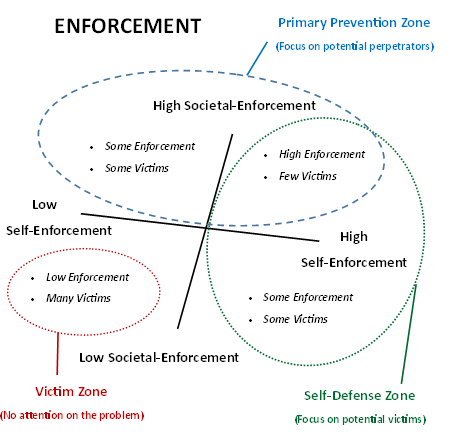In the world of personal safety, it is inevitable to run across the debate of whether people should discuss/focus on/think about/act on teaching potential victims how not to be victimized OR discuss/focus on/think about/act on teaching potential perpetrators not to victimize.
This issue is particularly pertinent to self-defense promoters who are commonly accused of Victim-Blaming by focusing on teaching potential victims how not to be victimized. They are told that society should instead be focusing on how to teach potential perpetrators to not perpetrate (a/k/a Primary Prevention).
This argument only serves to confuse the issue. What everyone needs to focus on is Enforcement.
Enforcement is defined as “the act of compelling observance of or compliance with a law, rule, or obligation.”
Enforcement serves as a means to punish current violations and deter future violations. Enforcement is also a form of teaching respect for laws and the rules of behavior.
A high rate of repeat violations is the result of low enforcement. A low rate of repeat violations is the result of high enforcement. Enforcement comes in two types. They are:
1) Self-Enforcement actions executed by the individual. (what is typically thought of as self-defense)
(2) Societal-Enforcement actions executed by society. (includes bystanders, friends, family, police, etc.)
Self-Enforcement and Societal-Enforcement are NOT either/or. They are NOT mutual exclusive. They can occur separately or together. They can be combined to different degrees.
In general, reducing Self-Enforcement actions lowers overall enforcement which translates to more violations.
In general, reducing Societal-Enforcement actions lowers overall enforcement which translates to more violations.
The lowest rate of violations is the result of the combination of both Self-Enforcement and Societal-Enforcement.
There is no definitive research which has determined whether Self-Enforcement is more or less effective than Societal-Enforcement or vice-versa. Effectiveness is usually dependant on the individual situation. But effective overall enforcement has throughout human history lead to reduced violations. Effective overall enforcement is the basis for secure civilizations.
Therefore, the promotion of either Self-Enforcement or Societal-Enforcement at the expense of the other, is indirectly contributing to lower overall enforcement and to more violations.
It is inconsistent to claim to care about reducing the rate of violations while also lobbying against either Self-Enforcement and/or Societal-Enforcement.
